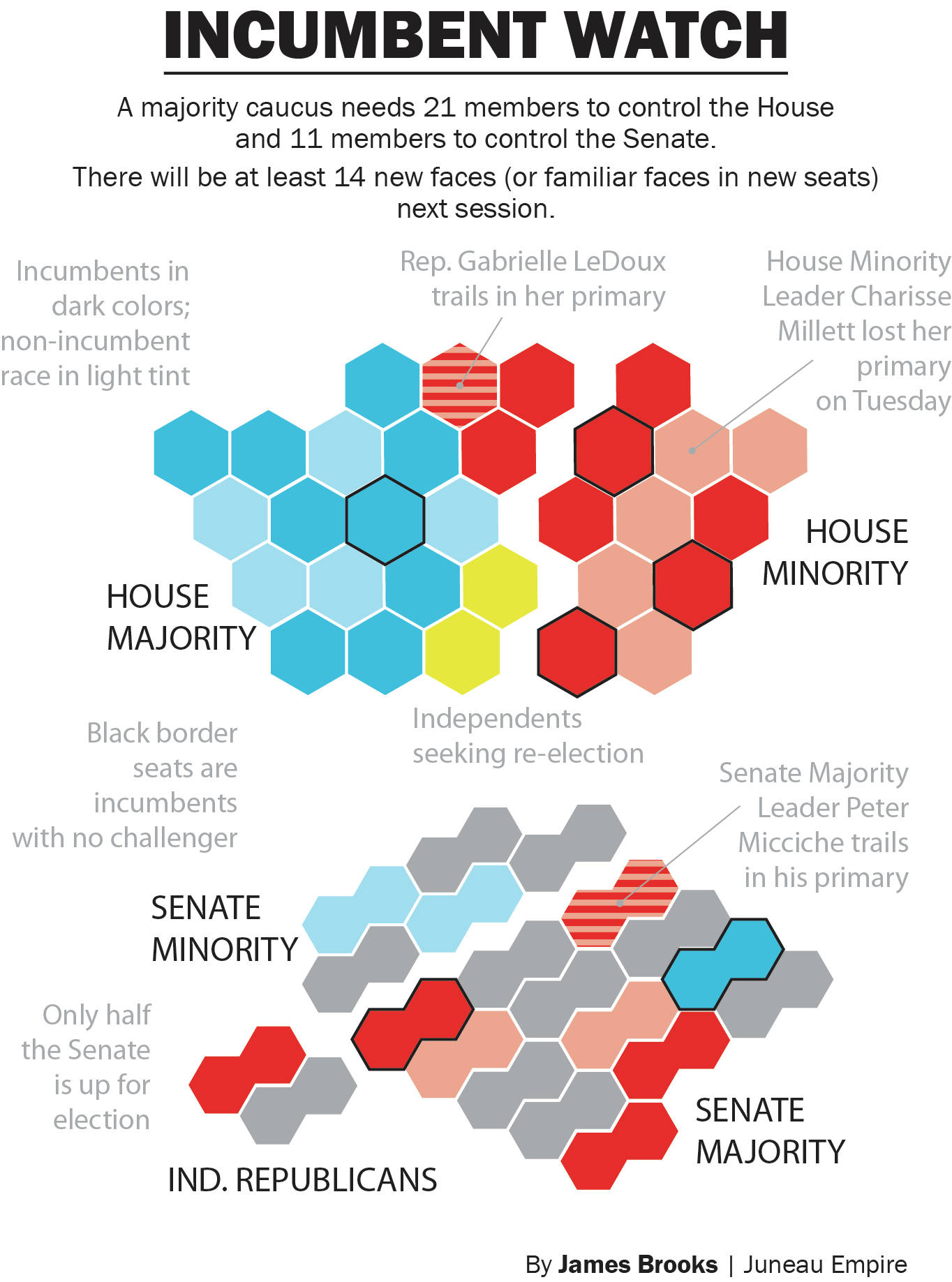On Tuesday, workers at the Alaska Division of Elections will begin counting absentee and question ballots from across the state. Those votes may tilt the balance for three legislative seats left virtually tied after Election Day.
In turn, those seats may tilt the balance in the Alaska Legislature at large.
In a series of interviews with incumbent lawmakers last week, the Empire attempted to answer a basic question: What do Tuesday’s primary election results tell us about the direction the Legislature will take next year?
Some lawmakers spoke on background in order to talk freely during an election campaign. Others offered their thoughts on the record.
Most said it’s too early to tell who will be in the majority, but they did say that voters, particularly Republican voters, seem to be willing to re-fight battles that many lawmakers thought had been partially or wholly settled over the past four years.
Critically, those battles include crime legislation and the role of the Alaska Permanent Fund in solving the state’s deficit.
“They’re such potent emotional issues that it’s going to be very attractive for candidates and legislators to continue to fight them,” said Rep. Dan Saddler, R-Eagle River.
Saddler, who served in the House Republican Minority during the last session, ran for Senate in Tuesday’s Republican primary, only to be defeated by Rep. Lora Reinbold, R-Eagle River, who also sought the seat.
Sen. Gary Stevens, R-Kodiak, wasn’t up for election this year and independently came to the same conclusions as Saddler.
He also added that he’s concerned by campaign pledges to stay away from the system of binding caucuses that require members of a majority group to vote together on budget items.
On the Kenai Peninsula, for example, newcomer Ron Gillham leads incumbent Senate Majority Leader Peter Micciche, R-Soldotna, by 12 votes. Gillham has pledged to stay out of any binding caucus.
“The one thing the Legislature has to do is pass a budget,” Stevens said, and a binding caucus eases that process.
Last year, the Legislature voted to spend a portion of the Alaska Permanent Fund on general government expenses, an act that had the side effect of reducing the Permanent Fund Dividend. Candidates challenging incumbents this year have pledged to reverse that act.
“Those two things really put us in a tough spot for ever having a budget,” Stevens said of the Permanent Fund and no-caucus promises.
Reversing this year’s Permanent Fund plan would increase the state’s deficit to more than $2 billion per year, and unless lawmakers are willing to pass massive tax increases or spending cuts to close the gap, the state will run out of savings in short order.
While the Permanent Fund positions of gubernatorial candidates have garnered a great deal of statewide attention, the intentions of lawmakers matter more. Under the Alaska Constitution, the Legislature is in charge of approving state budgets, including the dividend.
This year, 50 members of the 60-person Alaska Legislature are up for re-election. Of those 50, 14 will be new faces. The incumbents occupying those seats are either not running for re-election or were defeated in the primary.
Among the latter class is House Minority Leader Charisse Millett, R-Soldotna.
Micciche could join that group, as could House Rules Chairwoman Gabrielle LeDoux, R-Anchorage. LeDoux trails her challenger by three votes.
Rep. Jonathan Kreiss-Tomkins, D-Sitka, was preparing for a campaign fundraiser when reached by the Empire on Friday afternoon. He said that Tuesday’s tumult appears to have been confined to the Republican side of the ballot.
While Democratic races had plenty of candidates (there were three Democrats each competing for the nominations in House District 33 and House District 20, for example), the margins were comparatively wide, and he didn’t view the results as a surprise.
“All of the surprises were on the GOP side,” he said.
He doesn’t know whether that speaks to an anti-establishment surge among Alaska Republicans or if it is merely a fluke of the primary.
“November’s going to be a real — well, we’ll find out,” he said.
• Contact reporter James Brooks at jbrooks@juneauempire.com or 523-2258.

